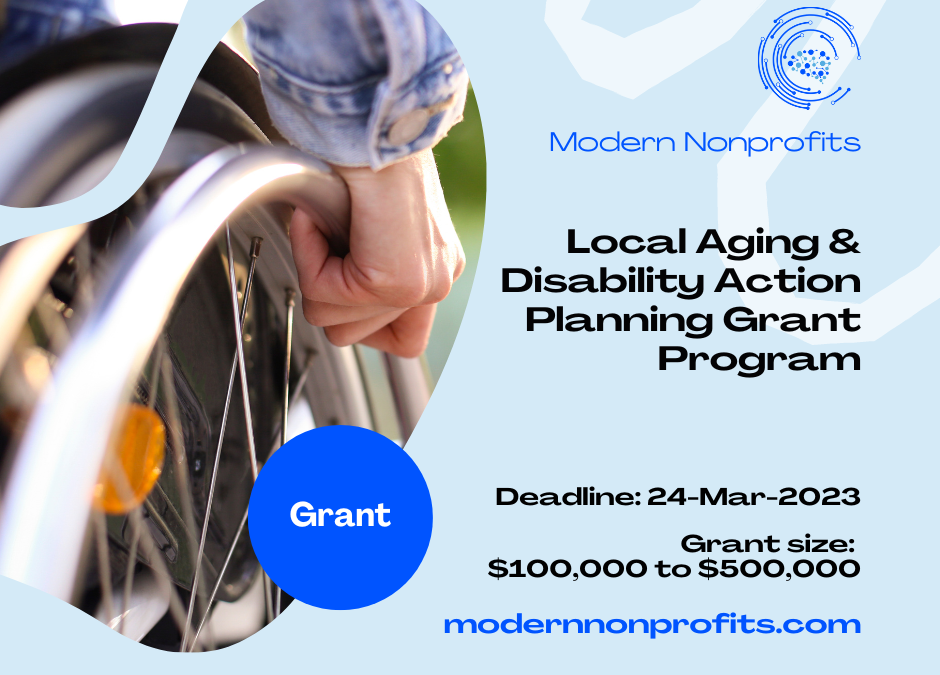Local Aging & Disability Action Planning Grant Program
Deadline Date: 24-Mar-2023
Donor Name: California Department of Aging (CDA)
Grant Size: $100,000 to $500,000
Category: Grant
Focus Countries: USA
More Info
CDA seeks applications from California entities including local government and/or nongovernmental organizations, community-based non-profit organizations, and/or tribal organizations, to assess, plan, and develop local plans that address the needs of older adults, people with disabilities, and caregivers.
CDA anticipates awarding grants to up to 36 communities throughout the state to support local communities in planning and creating their own age- and disability-friendly action plans. The local plans developed under this grant program aim to improve a community’s livability and address the current, emerging, and future needs of California’s older adults, people with disabilities, and professional and family caregivers through cross-sector collaboration and transformational systems change.
The grant program goals align with California’s Master Plan for Aging (MPA) and their state’s commitment to diversity, equity, inclusion, and accessibility. The grant program runs through March 31, 2025.
Grant Program Goals
- Grant recipients will develop local age- and disability-friendly plans that will:
- Improve community livability for people of all ages and abilities centered on equity, cultural competency, community engagement, and disability inclusion principles and practices.
- Combat racism, ageism, ableism, and biases in aging and disability systems of care.
- Address health and other inequities that can become cumulative with age.
- Elevate the strengths and voices of community members who are aging and/or living with a disability.
- Communicate a clear vision and strategic priorities for building and sustaining an ageand disability-friendly community.
- Strengthen the collective capacity of the community to address the current, emerging, and future aging and disability-related needs through cross-sector collaboration, defined as the intentional collaboration between two or more sectors to accomplish community goals and achieve community-level outcomes.
- Transform the infrastructure and coordination of services and supports serving older adults, people with disabilities, and professional and family caregivers across sectors.
- Guide government and non-government programs, services, policy, and funding.
- Build, enhance, and facilitate shared leadership, partnerships, and collaborations with diverse agencies, groups, and stakeholders to identify and act on shared values, mutual goals, and opportunities.
Objectives
- Objective #1: Awareness Stage: Build Community Awareness
- Objective #2: Planning Stage (Play One of the Local MPA Playbook): Establish an Advisory Committee and Gain Community Leader Support
- Objective #3: Planning Stage (Play Two and Three of the Local MPA Playbook): Community Assessment and Cross-Sector Engagement
- Objective #4: Planning Stage (Play Four of the Local MPA Playbook): Select your Goals and Priority Initiatives, and Develop a Local Plan
- Objective #5: Development Stage (Play five of the Local MPA Playbook): Build your Local Plan
- Objective #6: Early Implementation: Approve, Publicly Release, and Promote the Local
Purpose
- The purpose of the RFA is to support California communities strengthen their capacity and efforts to assess, plan, and develop a local age- and disability-friendly plan (defined as Local Plan for the remainder of the RFA document) through the following activities and strategies:
- Building public and private, cross-sector and multi-organizational partnerships, collaborations, and commitments.
- Facilitating community engagement opportunities for community members of all ages and abilities (individuals, groups, organizations, providers, and networks).
- Building intergenerational and cross-sector community and organizational awareness, support, and capacity to serve and support aging and disability community members, residents, and their families.
- Informing, educating, and engaging with local leaders and decision-makers (e.g., county and city elected officials).
Funding Information
- Applicants may request between $75,000 (minimum) and $200,000 (maximum) for the full project period of the grant program.
Eligibility Criteria
- California-based agencies and organizations that represent a community* that does not have a local age-friendly plan:
- Local government agencies
- Non-government organizations
- Tribal organizations
- Community-based non-profits and established coalitions that are classified as 501(c)(3) tax exempt under the Internal Revenue Services (IRS) Code.
- Under the RFA, community is defined as a city, a group of cities, a county, a group of counties, or Tribal land(s). Applicants may submit proposals as a single organization or on behalf of a consortium of organizations.
- Additional Applicant Eligibility:
- An Applicant that represents a community that is in the initial planning stages of creating a local age-friendly plan (i.e., building partnerships with the community and cross-sector organizations, engaging local leaders, and reviewing existing models), but does not have a local age-friendly plan is eligible for this grant program and encouraged to apply.
- An Applicant that represents a community that has conducted recent community assessments but does not have a local age-friendly plan, is eligible for this grant program and encouraged to apply. These Applicants must clearly describe the data collection activities that took place and findings in their application. If awarded, Applicants in this stage may be required to conduct additional assessment activities to align with the grant’s requirements.
- An Applicant that represents a community that has already developed a local age friendly plan is not eligible to apply for this planning and capacity-building planning grant.
- The Applicant must:
- Operate within the community they are authorized to serve.
- Exhibit the organizational readiness, commitment, and experience to complete the activities identified in the Applicant’s project narrative, work plan, and scope of work (SOW) that adhere to the RFA’s requirements.
- Display diverse partnerships with aging and disability service providers and professionals to plan and develop a community-informed Local Plan.
- Demonstrate a commitment to diversity, equity, inclusion, and accessibility principles and practices.
- Have the capacity to adhere to the contractual, fiscal, and program reporting requirements of the RFA and CDA.
For more information, visit CDA.


